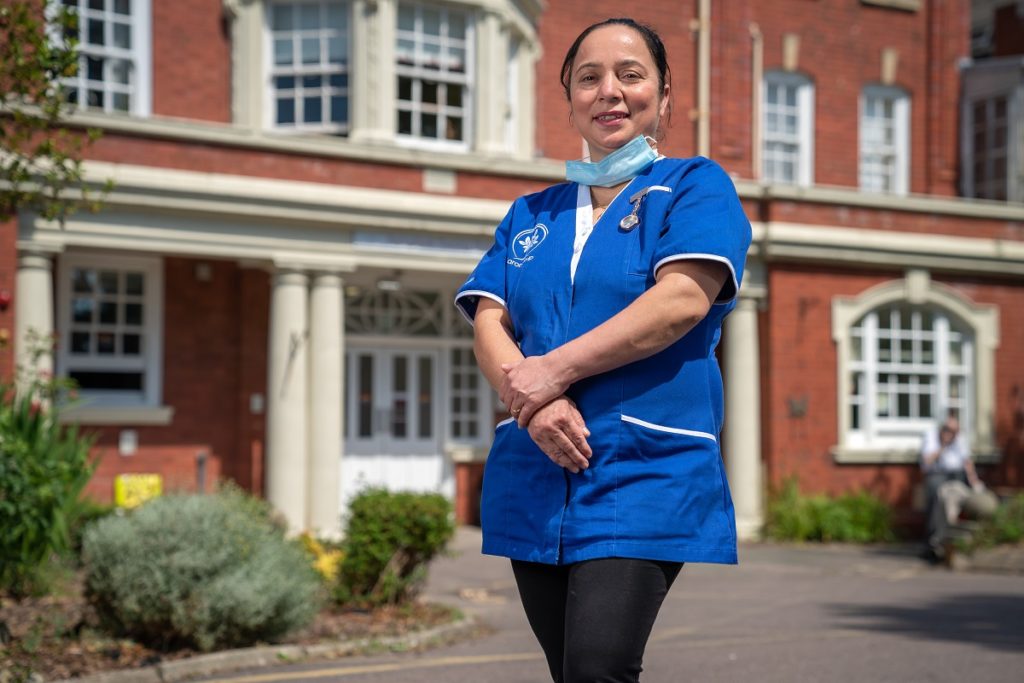
A senior nurse at a care home who is back working on the frontline after recovering from Covid-19 has spoken movingly about hearing that her close friend had died from the disease on same day she was diagnosed with it.
According to Navjit Kaur, who comes originally from India and is the deputy manager of the Springbank Care Home in Barry, she feared she would also die and said it was the first time she had ever thought about her own funeral.
Navjit, the home’s clinical lead, welcomed the launch of a new Welsh Government online risk assessment toolkit to reduce risk among care workers like her from black, Asian and minority ethnic (BAME) backgrounds but says it’s vital to back up the policy with the necessary funding to make it happen.
She is backing a campaign by her bosses at the Caron Group, which has 14 care homes in South and Mid Wales, and sector champions Care Forum Wales calling for extra resources to finance the additional costs that would be involved.
Navjit said COVID-19 made her more ill than she has ever felt – her whole body ached, she struggled to breathe and she was mentally overwhelmed
Finding out about her friend’s death on the same day that she herself received her positive test result was both heartbreaking and terrifying.
Her friend was Bridgend nurse Leilani Medel, who came to South Wales from the Philippines more than 10 years ago. She died on Good Friday.
Navjit is still shocked to the core by Leilani’s death and by the indiscriminate way COVID-19 can rip through communities.
Neither of them had any underlying illnesses, they were fit and did not smoke or drink.
Navjit who lives in Barry and has worked in Wales for more than 13 years, said: “The truth is this disease does not discriminate. It can affect anyone, it’s merciless.
She was infected with COVID-19 and was even more fearful in the light of research which highlighted the disproportionate impact the virus has on the BAME community.
Latest data has shown 72 per cent of health workers most severely affected by COVID-19 symptoms were from a BAME background.
Navjit said: “I’ve never been so scared. I genuinely feared for my life. I lived in my bedroom for 10 days, deeply afraid of passing it to my husband and daughter.
“We talked about my funeral arrangements in case the worse happened and I worried I’d never see them again, never get to hug my daughter. I had to call my parents in India and explain to them.
“I ached all over my body, and I was so tired all the time. Even knowing loved ones are only in the next room, you still feel alone and scared.”
She spent 10 days in quarantine but on the 11th day was well enough to return to work. She says she does not feel brave for going back to the front line so quickly.
Navjit said: “Nursing is all I’ve ever wanted to do. It’s what I love. I had to come back for my patients and also for my own wellbeing. I was afraid if I stayed off work I’d be gripped by depression and I didn’t want to let the virus prey on my mental wellbeing like that. My only option was to come back and face it head on.”
She considers herself extremely lucky to have survived but remains wary about the future unpredictability of COVID-19.
Navjit said the Welsh Government’s rolling out of an online toolkit for all care workers to assess their risk of catching the disease was hugely needed.
It enables care home employees to do their own assessment resulting in a score level from 1-10. Anyone who scores six and above is deemed to be at greater peril of catching COVID-19 and should immediately tell their employer.
The protocol is that managers should then remove high scoring employees from front line COVID-19 duties.
Navjit said: “It’s a significant improvement from the early days when many care homes were left flailing, desperately short of protective equipment and emergency resources.
“But there’s still more to be done to protect care home staff and patients.
“It’s true care workers from the BAME community are disproportionately affected and we don’t really know why that is. But others are also extremely vulnerable, people with diabetes or asthma, for instance.”
It was a sentiment echoed by Caron Group managing director Sanjiv Joshi, a leading member of Care Forum Wales which represent more than 450 social care providers.
Mr Joshi said: “This initiative is to be greatly applauded but it’s crucial to underscore it with practical and financial measures to support the struggling care sector through this national emergency.
“The health and safety of our patients and our staff are at the forefront of our minds every day and we will actively encourage all our employees across every care home to use this toolkit. But equally we need government support to help us source alternative resources in the event that staff who score highly on the risk factor scale have to be moved to alternative duties.
He added: “The social care sector in Wales was promised £40 million emergency Government funding to help us combat Coronavirus, to protect staff and save lives. But many care homes have yet to see a penny of this.
“While we 100 per cent welcome its launch, we also urge the government to follow it up with immediate practical support especially for care homes where employees are found to score in the higher risk categories.”
Care Forum Wales chairman Mario Kreft MBE said: “This is a significant first step in what we hope will be an ongoing process to fully arm the care sector with all the resources it so desperately needs in this unprecedented battle for survival.”